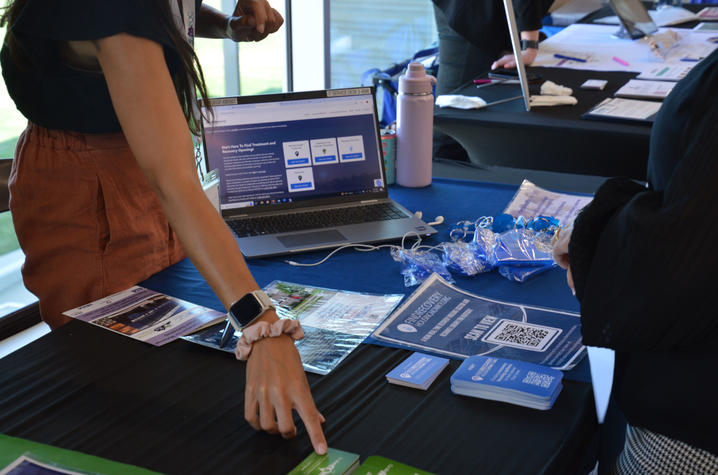Recovery programs help Kentuckians with substance use disorder

LEXINGTON, Ky. (Sept. 23, 2024) — National Recovery Month, established in 1989, is held every September to promote and support new evidence-based substance use disorder (SUD) treatment and recovery practices. The month celebrates the nation’s strong recovery community and acknowledges the dedication of service providers and communities that make recovery possible.
This year, the Kentucky Injury Prevention and Research Center (KIPRC) is highlighting three pivotal (SUD) recovery programs: FindRecoveryHousingNowKY.org, the Rural Center of Excellence on Recovery Housing, and Kentucky Access to Recovery. These programs play a crucial role in supporting recovery efforts across the state. By celebrating recovery journeys and integrating lived experiences into their work and projects, KIPRC strives to remain aware and sensitive to the people involved in these programs. Through innovative solutions and community collaboration, these programs continue to contribute significantly to recovery efforts in Kentucky.
FindRecoveryHousingNowKY.org
FindHelpNowKY.org, launched in 2018 by KIPRC to connect individuals with SUD to treatment facilities, was revamped earlier this year to also provide near-real-time access to mental health treatment, recovery housing and naloxone distribution sites. The integration of FindRecoveryHousingNowKY.org has made the platform a central hub for locating recovery housing with available openings across Kentucky for people in substance use disorder recovery.
The updated platform offers customizable filters, allowing users to search by location, treatment type and facility policies. This functionality has improved access to care and recovery support services.
“Adding FindRecoveryHousingNowKY, as well as FindMentalHealthNow and FindNaloxoneNow, to the online FindHelpNow platform gives autonomy and agency to anyone curious about the next steps in their recovery journey,” said Leah Dick, research program manager of FindHelpNow. “We want Kentuckians to easily find the resources that fit their current priorities.”
The revamped site has received positive feedback, particularly for its all-in-one access to resources.
Dick said program staff continues to add facilities and recovery organizations across Kentucky to the platform. She encourages communities to reach out if a local resource isn’t included, adding, “Our outreach specialists can help onboard them in less than 15 minutes.”
Recovery Community Organization Engagement (RCOE)
The Rural Center of Excellence on Recovery Housing (RCOE-RH) focuses on increasing the quality and availability of, and access to, recovery housing in rural counties in Kentucky. Funded by the U.S. Department of Health and Human Services’ Rural Opioid Response Program and led by the Fletcher Group Inc. (FGI), the RCOE-RH has helped 25 new recovery housing facilities with 262 beds in rural areas open over the past 3.5 years.
As a sub-awardee, KIPRC collaborates with FGI to enhance support services, with a focus on employment. KIPRC’s work involves developing toolkits to help employers create recovery-ready workplaces, preparing individuals in recovery for new employment and providing peer support training to persons in recovery.
“Employment is essential to recovery,” said Catherine Hines, RCOE-RH program manager at KIPRC. “We are focused on helping individuals explore new opportunities while supporting employers in employing and retaining their workforce including persons in recovery.”
Kentucky Access to Recovery (KATR)
Since 2019, the Kentucky Access to Recovery (KATR) program has provided critical recovery support services to vulnerable populations across 25 Kentucky counties. Funded by the U.S. Substance Abuse and Mental Health Services Administration and administered by Fahe and the Kentucky Opioid Response Effort, KATR uses a voucher system to connect individuals with opioid and stimulant substance use disorders to essential services, including recovery housing, transportation, basic needs clothing and employment support. The program prioritizes individuals who are recently incarcerated, veterans and those who are pregnant, postpartum or parenting.
“The Kentucky Access to Recovery program prioritizes populations of greatest need to help them begin their recovery support journey faster,” said Kelsey Carter, research program administrator at KIPRC.
In 2023, KATR launched an evaluation process to assess its impact. The evaluation — conducted by KIPRC — aims to understand the degree to which the voucher system supports participants’ recovery, reduces overdose risks and promotes long-term recovery. Feedback from clients and stakeholders will be included in a final report to the Kentucky Cabinet for Health and Family Services, guiding future program development and addressing ongoing community needs.
KIPRC is proud to support these innovative programs that are helping improve access to recovery services and empowering individuals on their path to long-term recovery.
As the state’s flagship, land-grant institution, the University of Kentucky exists to advance the Commonwealth. We do that by preparing the next generation of leaders — placing students at the heart of everything we do — and transforming the lives of Kentuckians through education, research and creative work, service and health care. We pride ourselves on being a catalyst for breakthroughs and a force for healing, a place where ingenuity unfolds. It's all made possible by our people — visionaries, disruptors and pioneers — who make up 200 academic programs, a $476.5 million research and development enterprise and a world-class medical center, all on one campus.




